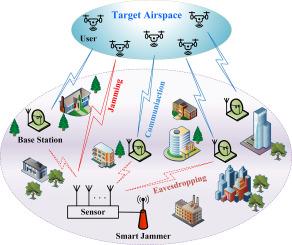非零和博弈中智能干扰机的节能策略生成:一种深度强化学习方法
IF 4.6
2区 计算机科学
Q1 COMPUTER SCIENCE, HARDWARE & ARCHITECTURE
引用次数: 0
摘要
本文研究了智能干扰机(SJ)和智能无线通信系统(WCS)之间的无线电通信对抗(RCC),重点是功率效率。虽然可编程无线电技术使SJ具有各种攻击模式,但目前的干扰决策方法仍然主要针对基于规则的对手,并在传统的决策框架内运行,重点是全功率抑制。这些方法不足以解决涉及新自由度的干扰问题,表现出低能量效率,并且无法处理智能对手。为此,我们提出了一种多模式智能干扰方案,SJ通过选择工作模式和调节干扰功率来实现干扰效率的最大化。首先,我们将RCC建模为非零和博弈,并分析了纳什均衡的存在条件。然后,我们提出了一种基于深度强化学习(DRL)的近端策略优化夹夹(PPO-Clip)干扰策略生成算法,以辅助最优模式选择和功率控制,实现干扰成功率和功耗之间的平衡。最后,我们对单智能和异构“智能对智能”场景进行了仿真实验。结果表明,该方法可以提高总体干扰效率,优于基准方法。本文章由计算机程序翻译,如有差异,请以英文原文为准。

Energy-efficient strategy generation for smart jammer in non-zero-sum games: A deep reinforcement learning approach
In this paper, we investigate the radio communication countermeasures (RCC) between the smart jammer (SJ) and the intelligent wireless communication system (WCS), focusing on power efficiency. While programmable radio technologies empower SJ with various attack modes, current jamming decision-making methods still primarily target rule-based opponents and operate within the traditional decision framework focused on full-power suppression. These methods are inadequate in addressing the jamming problems involving new degrees of freedom, exhibiting low energy efficiency, and failing to deal with intelligent opponents. In response, we propose a multi-mode intelligent jamming scheme, where the SJ aims to maximize the jamming efficiency by selecting working modes and adjusting jamming power. Firstly, we model the RCC as a non-zero-sum game and analyze the existence conditions of Nash Equilibrium (NE). Then, we propose a proximal policy optimization-clipped (PPO-Clip) jamming strategy generation algorithm based on deep reinforcement learning (DRL) to assist in optimal mode selection and power control, achieving the balance between jamming success rate and power consumption. Finally, we conduct simulation experiments on single-intelligence and heterogeneous “smart versus smart” scenarios. The results indicate that the proposed approach can enhance the overall jamming efficiency and outperform the baseline methods.
求助全文
通过发布文献求助,成功后即可免费获取论文全文。
去求助
来源期刊

Computer Networks
工程技术-电信学
CiteScore
10.80
自引率
3.60%
发文量
434
审稿时长
8.6 months
期刊介绍:
Computer Networks is an international, archival journal providing a publication vehicle for complete coverage of all topics of interest to those involved in the computer communications networking area. The audience includes researchers, managers and operators of networks as well as designers and implementors. The Editorial Board will consider any material for publication that is of interest to those groups.
 求助内容:
求助内容: 应助结果提醒方式:
应助结果提醒方式:


